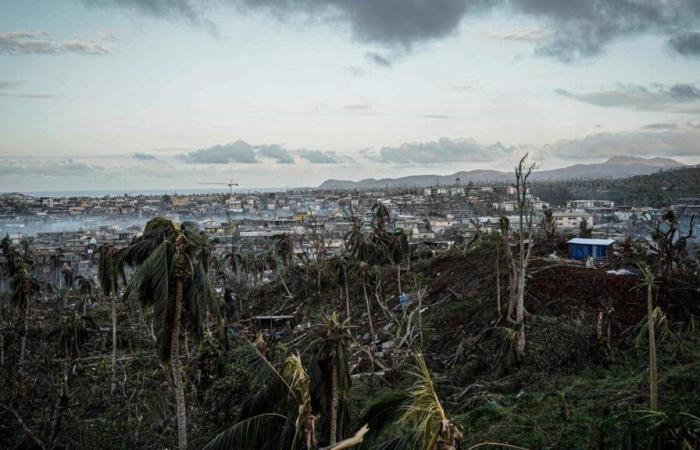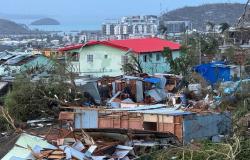The new Prime Minister, François Bayrou, is criticized for having favored the municipal council of Pau in the midst of the Mahoran crisis. In the archipelago, the situation remains very difficult.
Authorities fear thousands of deaths
A curfew will be introduced on Tuesday evening from 10 p.m. to 4 a.m. in this Indian Ocean territory to ensure security and avoid looting, as residents still lack everything. The provisional toll reached 22 dead and 1,373 injured, according to figures communicated Tuesday evening by the Ministry of the Interior.
But the authorities fear “several hundred” deaths, perhaps even “a few thousand” in the poorest department in France. As of Tuesday noon, the mobile telephone network still remained 80% unavailable, according to the authorities, and almost half of the archipelago is still without electricity.
The count is all the more complicated because Mayotte is a land with a strong Muslim tradition and, according to Islamic rites, the deceased must be buried as quickly as possible.
The most intense cyclone in almost a century
“70% of residents were seriously affected,” explained Bruno Retailleau, resigning Minister of the Interior, announcing the arrival “in the coming days” of 400 additional gendarmes to lend a hand to the 1,600 gendarmes and police present on the site. ‘archipelago.
The cyclone, the most intense that Mayotte has experienced in 90 years, ravaged the Indian Ocean territory on Saturday, where around a third of the population lives in precarious housing, which was completely destroyed.
Cyclones usually develop in the Indian Ocean from November to March, but this year surface waters were close to 30°C in the area, providing more energy for storms, a phenomenon linked to observed global warming also this fall in the North Atlantic and the Pacific.
It also killed at least 34 people in Mozambique, injured more than 300 and destroyed more than 20,000 homes, the National Institute for Risk and Disaster Management announced on Tuesday.
General water shortage
Trees uprooted, debris littering the hills as far as the eye can see, boats piled up: on Petite-Terre, in Mayotte, the decor is apocalyptic more than three days after the passage of the cyclone.
“Everyone is rushing to the stores for water. It’s a general shortage,” explains Ali Ahmidi Youssouf, a 39-year-old Comorian who walks on the road with a few bottles in his hand. The priority is to ensure the “vital needs” of residents in terms of water and food, Bruno Retailleau insisted on Monday, with the health situation continuing to deteriorate.
Clearing operations continue: around 80% of the departmental and national network was cleared on Tuesday. Once the roads are cleared, “we have to go to each house, each room, turn over each sheet of metal, to be able to confirm whether or not there are victims,” explained Yaël Lecras, vice-president of the national sappers union. -professional firefighters, on BFMTV.
The hospital is at half its activity
On the archipelago, the first medical desert in France, the only hospital, badly damaged, has regained “some 50%” of its activity, indicated François Bayrou, and will be supported by a field hospital from Thursday.
On Monday, 25 patients in “urgent situation” were evacuated to Reunion. The dialysis stock is “destroyed” in Mayotte, according to the Mayia Mayotte dialysis center, which requested the evacuation of 280 other patients. On the military side, an A400M transport plane shuttles Réunion-Mayotte for possible evacuations of vulnerable people and a second A400M provides a direct connection from mainland France to Mayotte, we learned from the army headquarters. .
The Overseas Support and Assistance Vessel (BSAOM) Champlain, which set sail from Reunion Island, is due to arrive in Mayotte on Thursday morning with 180 tonnes of freight on board, according to the same source. Another priority for the authorities is sending tents and tarpaulins to restore habitats that have been completely destroyed or whose roofs have been torn off by wind gusts that reached more than 220 km/h.
Call for volunteers
In an emergency to find a roof over their heads, many residents have already started clearing and rebuilding without waiting for help. In Mamoudzou, the capital, where emergency services expect to find many victims in the rubble of the highly populated shanty towns, the town hall on Monday called on its adults and residents in “good physical condition” to “strengthen the teams on the ground” .
According to Florent Vallée, of the French Red Cross, “entire families” and “many alone” and “abandoned” minor children live in bangas, these small traditional houses now destroyed.
Calls for international solidarity
In order to strengthen its staff on site, the national police launched a call for volunteers “from all sectors” on Tuesday, for “at least four weeks”. The authorities on site noted that “tensions were beginning to appear”, with people flocking to service stations, two thirds of which were requisitioned for emergency vehicles.
Total Energies said on Tuesday that it was deploying “all means at its disposal to ensure the supply of fuel to the archipelago”. Calls for solidarity have multiplied in France and abroad. After the United States, Germany declared on Tuesday that it was “ready to provide aid and support”.






